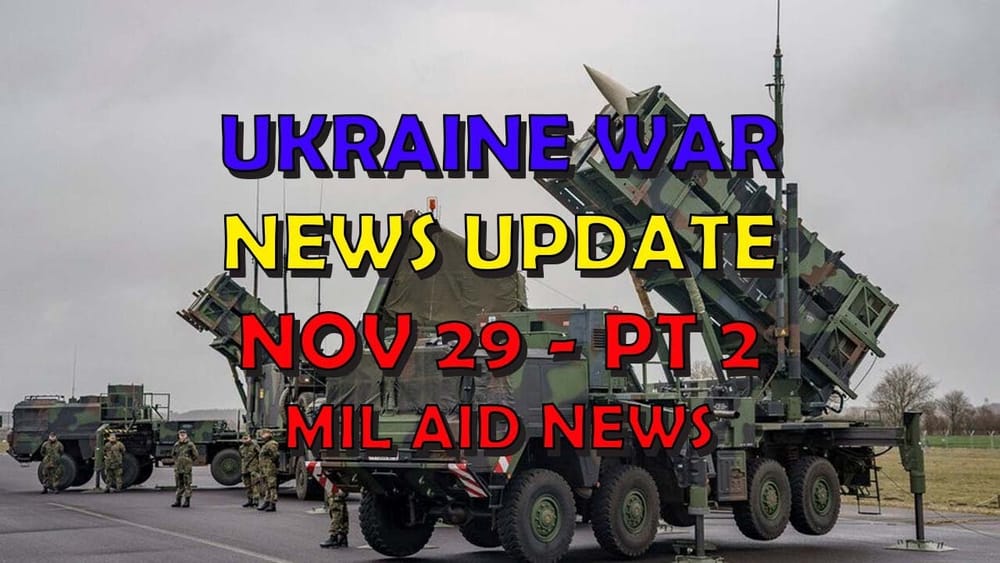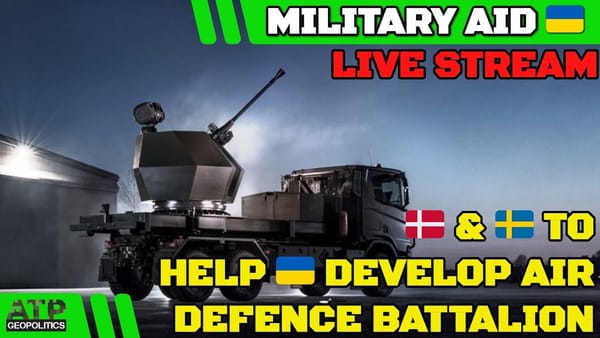Ukraine War Update NEWS: Military Aid News
🤖
This summary has been produced automatically by an AI Large Language Model (LLM) without any human intervention. Whilst every effort has been made to prompt the LLM to produce accurate output, there may be inconsistencies, inaccuracies or hallucinations!
Table of Contents 📖
"They are pig ignorant of what is going on."
Hello Team
🎦 00:00-00:11⏩
- Jonathan welcomes viewers to another ATP Geopolitics video, a Ukraine War News Update (Part B) for 29th November 2024.
Possible Russian landing ship or S400 hit in Crimea
🎦 00:11-02:13⏩
- Jonathan revisits the previous video on hits and losses, discussing a claim about an explosion in Tuapse, a Russian Black Sea port and oil refinery previously targeted by Ukraine.
- Reports and satellite footage from the Crimean Wind Telegram Channel suggest a 135-meter-long ship, possibly a large landing ship or the warship Ivan Gren, may have been struck.
- Another claim suggests the explosion in Crimea, specifically in Vitino on the western coast, might have involved an S-400 air defence system, a strategically important location for radar and defence capabilities.
- Jonathan notes this aligns with previous Ukrainian strikes on similar radar and S-400/S-300 systems in the region.
Norway increases military aid for Ukraine to $3.2 billion in 2025
🎦 02:13-05:22⏩
- Jonathan discusses Norway's significant support for Ukraine, highlighting its increased oil revenue and national wealth fund that has allowed it to provide substantial aid.
- He contrasts Norway's approach to managing oil resources with the UK's, emphasizing the benefits of Norway's national ownership model.
- The Norwegian Conservative opposition party successfully pushed the ruling Labour government to increase aid to Ukraine from an initial $1.36 billion to $3.16 billion for 2025, more than doubling the initial proposal.
- Jonathan commends Norway's commitment, acknowledging it's smaller economy compared to the US but emphasizing the importance of increased European support.
- He notes that this increase sends a positive signal to other European nations and suggests they should follow suit, especially with the potential for reduced US aid under the new Trump administration.
Potential shift in US stance on military aid to Ukraine under Trump
🎦 05:22-10:41⏩
- Jonathan discusses a potential shift in the US stance on military aid to Ukraine under the new Trump administration, citing observations by a pro-Republican commentator, David D.
- J.D. Vance, Trump's Vice President, has deleted/hidden previous anti-Ukraine posts, suggesting a possible change in his public position.
- Jonathan speculates that the US government might be receiving intelligence that highlights the importance of supporting Ukraine for US national interests.
- He notes the lack of pushback from Trump and his administration on Biden's request for $24 billion in aid to Ukraine, as well as other initiatives, like lifting restrictions on long-range strikes into Russia and using frozen Russian assets to support Ukraine.
- Jonathan explores two potential scenarios for Trump's approach to Ukraine:
- Trump might help Ukraine for self-serving reasons, seeking to appear as a savior.
- Trump and his associates, who have previously promoted anti-Ukraine narratives (e.g., Elon Musk, Tucker Carlson), might be changing their stance based on new information and intelligence briefings.
- Jonathan criticizes the previous willful ignorance of Trump and his circle, arguing that their lack of understanding of the situation has been damaging and irresponsible.
- However, he acknowledges the possibility of a positive pivot, which could lead to increased US support for Ukraine.
Norway and Poland agree to share responsibility for protecting military aid transit hub
🎦 10:41-11:02⏩
- Jonathan reports that Norway has agreed to share responsibility with Poland for protecting a key transit hub for foreign military aid to Ukraine, as announced by Polish Prime Minister Donald Tusk.
- He suggests this reflects a growing trend of European nations taking on more responsibility for supporting Ukraine, potentially in response to pressure from the US.
South Korea refuses to sell weapons to Ukraine but offers $100 million in aid
🎦 11:02-12:43⏩
- South Korea has refused to sell weapons to Ukraine, including anti-aircraft systems and radars, citing constitutional restrictions due to Ukraine's involvement in the war, despite Ukraine's willingness to purchase rather than receive free aid.
- This decision has caused anger and frustration in Ukraine.
- As a gesture of goodwill, South Korea offered Ukraine $100 million in aid for social support.
- Jonathan notes that Ukraine urgently needs South Korean military equipment and finds this response inadequate.
Japan provides $235 million for World Bank projects in Ukraine
🎦 12:43-13:03⏩
- Japan has provided Ukraine with $235 million in funding for two World Bank projects, "Rise" and "Learn," aimed at supporting entrepreneurship and education resilience during the war.
- Jonathan acknowledges that this might be previously announced funding allocated through the World Bank or IMF.
Netherlands delivers Patriot missile launchers to Ukraine
🎦 13:03-15:32⏩
- Jonathan, after a much-needed cup of tea, addresses a message from a viewer, "German H2 Ukraine," about the delivery of Patriot missile launchers from the Netherlands to Ukraine.
- He clarifies that this delivery consists of three launchers and a radar, part of a previous Dutch pledge to help assemble a complete Patriot fire unit for Ukraine.
- The initial plan was for the Netherlands to provide some parts and other nations to contribute the rest, but this didn't fully materialize.
- While not a full battery, the radar and launchers will be integrated into existing Ukrainian systems.
German Patriot systems vs. American Patriot systems
🎦 15:32-17:03⏩
- Jonathan clarifies the differences between German and American Patriot systems.
- He explains that German Patriot systems are truck-mounted, which provides greater mobility and allows for shoot-and-scoot tactics, unlike the trailer-mounted American systems.
- He suggests that the US forces could learn from this approach.
- Jonathan cites evidence suggesting the effectiveness of the German Patriot systems used by Ukraine in shooting down Russian aircraft, including helicopters and planes.
Ukrainian and Finnish companies establish joint venture for drone production
🎦 17:03-17:35⏩
- Several Ukrainian and Finnish companies have established a joint venture in Finland to produce drones.
- The facility is expected to start production in the first half of 2025, initially focusing on aerial reconnaissance drones.
- This initiative aligns with the growing trend of long-term projects supporting Ukraine's defence capabilities.
Potential implications of forced negotiations and Trump's rhetoric
🎦 17:35-19:12⏩
- Jonathan discusses the potential implications of Ukraine being forced into negotiations by the US, particularly if it prevents them from benefiting from future military aid and projects like the drone production facility.
- He warns against being misled by Trump's rhetoric about quickly resolving the conflict, emphasizing that it's a complex situation that will likely require a lengthy negotiation process.
- Jonathan cautions that even if a peace deal is reached, fighting might continue during the negotiations, making it a gradual and multifaceted process rather than an immediate resolution.
Ukrainian ground drone with drone jammers
🎦 19:12-19:35⏩
- Jonathan shows footage of a Ukrainian ground drone equipped with multiple drone jammers, expressing interest in its potential effectiveness.
- He acknowledges the comedic element of the footage, where drones are jokingly thrown onto the floor.
Discussion on Ukrainian mobilization and protecting younger generations
🎦 19:35-21:46⏩
- Jonathan highlights discussions about the US pressuring Ukraine to mobilize more young men for the war effort.
- He shares insights from Oliver Carroll and retired Australian General Mick Ryan, emphasizing the sensitivity surrounding the loss of young people in a war for national survival.
- Ukraine's demographic challenges, including a plummeting birth rate in the early 2000s, are discussed, with the understanding that mobilizing the 18-25 age group could have severe long-term consequences for the country's future.
- Jonathan acknowledges the need to balance the immediate demands of the war with the importance of preserving Ukraine's future generations and their potential to rebuild and develop the country.
Boris Johnson advocates for European troop deployments in Ukraine as part of peace deal
🎦 21:46-22:24⏩
- Jonathan mentions Boris Johnson's recent interview where he suggested that European nations should consider deploying troops within Ukraine as part of any future peace agreement.
- While Johnson's proposal focuses on a post-peace deal scenario, Jonathan expresses his personal support for such deployments even before a formal agreement is reached.
Russia's crypto-mobilization and forced recruitment
🎦 22:24-25:36⏩
- Jonathan discusses a thread by Chris O'Wickey on the increasing use of police and vigilante groups in Russia to force young people, migrants, and seasonal workers into signing military contracts.
- This "crypto-mobilization" is driven by the significant shortfall in the number of volunteers willing to fight in Ukraine.
- According to reports, military enlistment officers, law enforcement, and Cossacks are conducting raids on residential buildings, pressuring individuals to sign contracts without proper vetting or eligibility checks.
- Jonathan highlights the desperation of the Russian authorities to address their manpower shortages while avoiding a politically damaging mass mobilization.
Russian Defence Minister Shoigu visits North Korea
🎦 25:36-26:07⏩
- Following Ukrainian Defence Minister Ruslan Umarov's visit to South Korea, Russian Defence Minister Sergei Shoigu has travelled to North Korea.
- Jonathan speculates that the purpose of Shoigu's visit is to secure military equipment and support for the war effort from North Korea.
- He shares a humorous observation from Tim White about Shoigu's seemingly uncomfortable appearance during his visit.
Wrap Up
🎦 26:07-26:15⏩
- Jonathan concludes the video, thanking viewers for their support.
🤖❓ AI Debrief (post task) - anything the AI didn't understand
No queries. I was able to understand the transcript and complete all tasks successfully.
🤖💭 AI Plan (pre task) - the AI's step by step thought process
1. Understand the Context and Overall Task:
I need to summarise video transcripts from the ATP Geopolitics YouTube channel, focusing on conciseness and clarity for viewers with limited time.
The summaries should accurately reflect Jonathan's insights, analysis, and opinions, as well as his personality and humour.
I need to follow specific rules for each task, including using British English and respecting Ukrainian spellings.
2. Breakdown the Tasks:
Task 1: Extract the title, date, and part of the video from the YouTube title using XML tags.
Task 2: Divide the transcript into distinct topics and create concise, specific, and quantified titles for each using XML tags with unique IDs.
Task 3: Determine the timeframe for each topic and record it using XML tags, ensuring the IDs match the topic titles.
Task 4: Write summaries for each topic, including context, key points, and Jonathan's opinions, using bullet points and markdown for emphasis.
Task 5: Select a meaningful or significant quote from the transcript.
Task 6: Identify any parts of the transcript or tasks I didn't understand.
3. Process the Transcript and Complete the Tasks:
I will read the transcript carefully, paying attention to the timestamps and the content of each segment.
I will follow the specific rules and guidance for each task meticulously.
I will use my knowledge of the ongoing conflict and Jonathan's style to create accurate and informative summaries.
4. Review and Refine:
After completing the tasks, I will review the summaries, quote, and queries for accuracy, clarity, and completeness.
I will ensure that the summaries reflect Jonathan's key points and insights.
I will make any necessary corrections or improvements before submitting my response.




